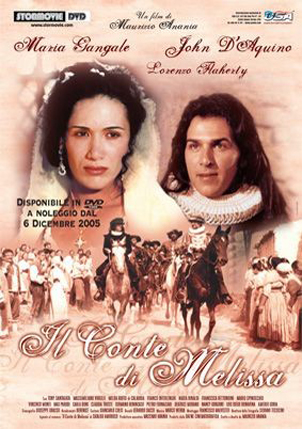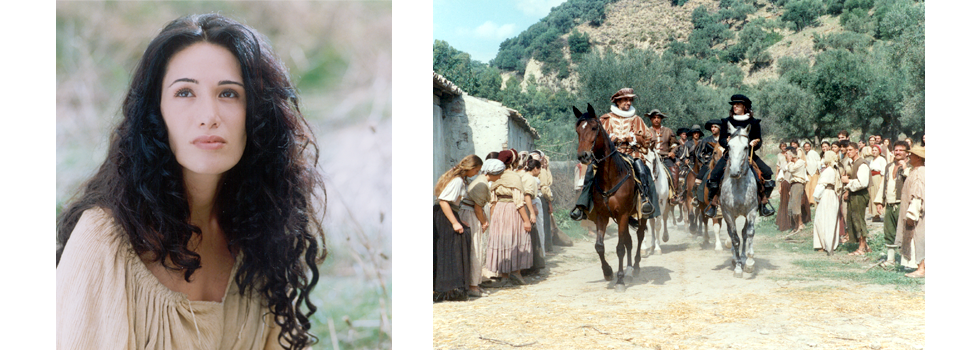
IL CONTE DI MELISSA
This is one of the latest releases from the small but consistently good Italian recording label, Hexacord. Their small, but impressive, catalogue includes scores that are real gems from Italian cinema. Il Conte Melissa is a romantic drama that is set in the 1600s. The soundtrack is the handiwork of composer Marco Werba, who is relatively new to the film music arena. He was, up until a while ago, actually writing about film music rather than composing it. The score that he penned for this period piece is a classic in more ways than one, the style in which he has approached the film is perfectly appropriate and the composer relies predominately upon the use of woodwind, strings, harp and choral passages to convey a sense of 17th century authenticity. The works central thematic property can be found in the cue ‘Ii Ritratto Dl Elenora’, which is the love theme from the movie. The theme is pleasant enough, but is really quite short lived and does not build sufficiently enough to warrant being labelled as a principal theme, although it certainly is lyrical and haunting. Werba returns to this thematic material in other cues and it is performed in varying arrangements that are also subdued, but contain an agreeable and affable sound to them.
The composer also introduces a secondary theme for the score, but this does not receive are introduction until near to the end of the work. In its first appearance the composer has it performed on recorder, which is supported by strings and also what sounds like a mandolin, this theme re-emerges on cues in the remainder of the score with choir and orchestra giving it a fuller and higher profile performance.
This is in my opinion an accomplished work that improves with each listen. Hopefully we will hear more from Marco Werba in the not too distant future. Packaging by Hexacord is eye catching and tasteful. Recommended.
John Mansell
II Conte di Melissa (The Count of Melissa) is an Italian film made in 2000. It is a drama set in the 17th century, but other than that it is difficult to say anything about it. The cover illustrations suggest something along the lines of, though hopefully better than, The Honest Courtesan. The insert notes are in Italian, and appear to talk about the music rather than the film, though in either case I can not read them. The promotional material which came with the CD is in English and contains a track listing, lyrics for the end-title song, and a one page biography of the composer.
Marco Werba is a young and distinguished Italian composer with a lengthy list of ‘serious’ compositions including a mass, various other choral music and a guitar concerto to his name, as well as a film music career going back at least as far as 1988 and his award-winning score for Zoo. (The award was the “Colonna Sonnora” – 1989).
Listening to the 27 tracks on this ambitious soundtrack one gets the impression of a serious, sober, understated, tragic historical romance. The music is predominantly slow, melodic, haunting and typically European. The orchestrations are detailed, with numerous instrumental soloists credited, as well as the traditional vocal soloists, soprano, contralto, tenor and bass, as well as the featured female voice of Antonella Neri.
The score is strongly influenced by, but not strictly in accordance with 17th century music. The use of recorder and harp together with the formal quality of the writing is evocative of the period, while there are dissonances and passages of introspective string writing which could not have been imagined before the 20th century. It is the sort of score one might have expected from Georges Delerue, or today from Jean Claude Petit – delicate and well crafted, with melodies which grow more powerful with each listen. However, if there is a central influence it is the music of Zbigniew Preisner; in the overall minimal style; in the wordless choral writing and specifically in a motif which repeatedly alternates between two chords in a most Preisneresque way; in the predominant recorder melodies which likewise echo La Double Vie de Véronique (1991), and finally in the use of a wordless soprano to carry much of the ‘voice’ of the score in a manner very much akin to that of Preisner.
The music becomes darker in tone and increasingly choral towards the end of the album, building to the resigned beauty of “L’assalto al castello” and the six-minute “Requiem in sol minore”, a moving set-piece drawing strongly upon the Italian early music tradition. The album closes with an end title song with words both in English and Latin. The title “Love was fatal to me” is liable to promote sniggers and lead to some expectation of a Celine Dion style atrocity shattering the carefully sustained mood. Fortunately nothing could be further from the truth and this is a rare example of a modern end title song being accomplished with due integrity, remaining faithful to the essence of the score which precedes it. Built around the main theme the song remains “in period” whilst employing some of the same background electronic textures which have appeared in certain cues throughout the score. It is all the more eloquent for doing so, and unlike the American ‘pop divas’ Antonella Neri can not only sing but has a beautiful voice. It is gratifying that the song does not insult the intelligence of the audience by assuming they can only relate to being spoon-fed in a contemporary pop/rock idiom.
Il Conte di Melissa is on album an excellent, subtle score which grows more rewarding with each play. Marco Werba may not have the most individual of styles but his music is most effective and I look forward to hearing more. Anyone with a love of melodic European film music should find this a most enjoyable release. Now will someone release the film in Britain?.
Gary Dalkin

